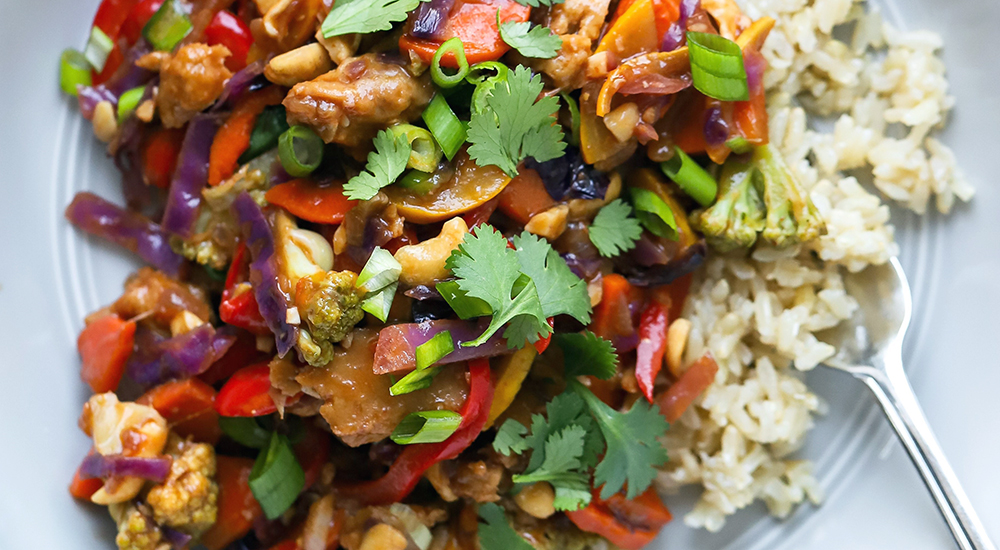When we hear the term “plant-based eating,” it is easy to think of the terms vegetarian or vegan. But there is a key difference: plant-based eating doesn’t exclude any food or food group.
Plant-based eating simply means eating mostly plants. It allows for an intuitive and inclusive approach to eating that avoids unnecessary restriction, which allows us to maintain our enjoyment of food while also meeting our health goals.
This diet has been scientifically shown to have more health benefits when compared to the standard American diet. Plants have essential nutrients to support our bodily processes, fiber to support the health of our gut bacteria, as well as antioxidants to protect our cells from threats that lead to inflammatory diseases and cancer.
By supporting our immune system and reducing inflammation, plant foods allow our bodies to minimize cellular stress while promoting longevity and good health.
Plant-based eating:
- Lowers the risk of heart disease and cancer. Plants are:
- Low in saturated fats and high in antioxidants, which can help prevent various cancers and cardiovascular diseases.
- A good source of heart-healthy unsaturated fats.
- Reduces chronic inflammation. Plant-based diets are high in:
- Fiber, which can help lower cholesterol, manage insulin resistance, stabilize blood sugar, and maintain a healthy culture of gut bacteria.
- Antioxidants and can help reduce inflammation in the body, especially when plant proteins are substituted for red meat and highly processed meats.
- Helps with weight management. Plant-based foods are:
- Often lower in calories than animal products.
- High in fiber and help us feel full for longer, which can help us to eat less.
Both USDA and VA recommend a balanced meal being 50% fruits and vegetables, 25% grains and starches, and 25% protein with the MyPlate meal balancing tool. That means at least 75% of a balanced plate is already plant-based, so you may be closer to following a plant-based eating pattern than you think.
Burger? Sure! There are “No Rules!”
You don’t have to completely cut out animal protein (meat, eggs, dairy, meats, fish/seafood) to have a plant-based diet. It is not “against the rules” to have your protein source alternate between plant sources and animal sources or to even combine them in a single meal. In fact, there are “no rules!”
The beauty of plant-based eating is its flexibility which allows you to find what works best for your tastes and health. The mentality of plant-based eating focuses on what you can add to your plate that is nutritious and makes the meal more exciting rather than what you are limiting or missing.
Ultimately, a plant-based diet develops from the conscious choices we make for our health and satisfaction.
For a great source for healthy, plant-based recipes, check out the VA Healthy Teaching Kitchen Recipe Library. You can also reach out to your local VA dietitian for help making healthier food choices and building a plant-based eating pattern.
Topics in this story
More Stories
Barry Peterson shares his experience as a VA virtual reality provider and user and how it helps him connect with other Veterans.
Caregivers ensure care for our Veteran’s doesn’t stop when they leave a VA medical center.
For the Great American Smokeout, explore VA resources and learn why every attempt to stop smoking is a step toward success.








Plant based diets are smart based on common sense and the information in “The Game Changers”. Take a look at that documentary! Bill Gates doesn’t affect my food choices and he shouldn’t affect yours.
Plant based eating is just another way people like Bill Gates is using his fortune to control the American lifestyle. Another liberal scam. Bill Gates Soylent Green dream!
This diet would put me in the hospital.My pre sugar dibetic condition would be back.My blood level is very good.
Plant based can’t include meat or animal based foods
Antonio
What a wonderful post! There are so many health and wellness related topics that involve diet. Many of them involve making choices between antagonistic goals. The best thing for everyone is to be as informed as possible on the latest scientific research. I am 62 years old and in very good health overall. I have several genetically and lifestyle choice related issues. My family has a history of cardiovascular disease, for example. There are many dietary and lifestyle choices that can improve my health related to this issue. However, I also have a love of beer. Beer makes my life so much better but is definitely not good for my cardiovascular situation. With both these realities in mind I have made a conscious choice to eat healthier and exercise and continue to enjoy beer. I fully acknowledge this choice. If health and longevity was my only objective there is an extensive list of things that will, on average, allow you to live longer. However, life without my little vices just feels like deprivation. I’m sure Mother Teresa (if she was still alive) would be able to weigh in on this. My choice is to enjoy in moderation and try to be smart with the majority. Currently Corona Extra is my adult beverage of choice although my favorite is Guinness Extra Stout. Something in Guinness affects my guts if I drink very much. Part of the joys of getting older.
Yes Yes Plant base nutrition is very healthy in food choices and health in not counting calories density but maintain yur plant base food choices on calories density such as salt and sugar can be be alow percent to maintain as well being